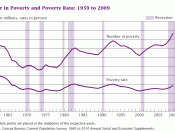Woman: "I've read some Anderson. I think that if that's the way those people want to live, then we should just let them alone. I mean, it's their choice."
Me: Slow down. I need you to define "those people," tell me how it is they live, and then give your reasons for why we should leave them alone.
Woman: The niggardly conditions of impoverished inner-cities are the inevitable result of the self-destructive behaviors practiced by its inhabitants. Individuals who graduate from high school, hold steady employment, and marry without first having children are virtually guaranteed a middle-class life. In the inner-cities, people seem almost oblivious to these realities. Individuals place little value on education, choose street life and crime over legitimate occupations, and the single-parent household has become the norm. Public education offers universal access to the first condition. Census Bureau surveys suggest the number of involuntarily unemployed is small, and no one has a child without choosing to have sex.
Students of inner-city schools are far more likely to drop out, and while young black males are far less likely to be employed than their Hispanic and white counterparts, one third of them will spend time in prison at some point in life. Two-thirds of black children are born out of wedlock. These are choices with predictable outcomes which only the individual can make, and until urban communities' behavior changes, there's nothing we can do.
Me: Everyone agrees that behavior needs to change, but people don't act in a vacuum. Decisions are made within a context of constraints and opportunities, and inner-city residents encounter obstacles that those in the middle-class do not. Moreover, the paucity of material and non-material resources available to individuals living in areas of concentrated poverty constricts the role of agency in determining outcomes. As...


